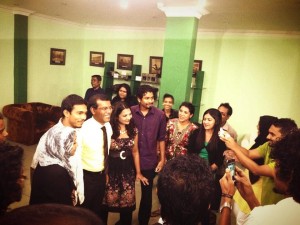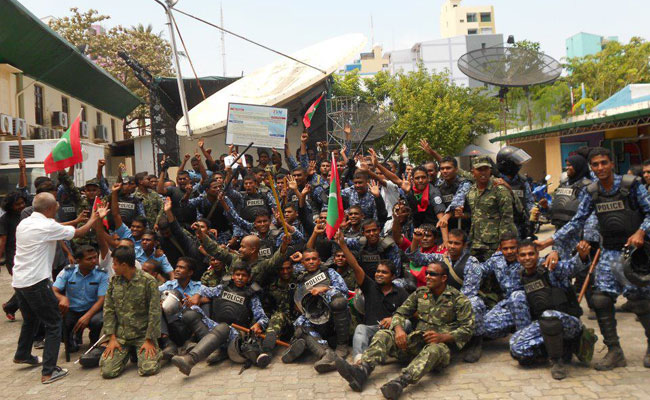The Dhivehi Rayyithunge Party (DRP) and President Dr Mohamed Waheed’s Gaumee Ihthihad Party (GIP) were forced to form a coalition to contest the upcoming presidential election out of necessity, former President Mohamed Nasheed has said, contending that the parties lacked grassroots support and comprehensive policies to represent “a third way” for voters.
Appearing on state broadcaster Television Maldives (TVM) Thursday night, Nasheed reiterated that power-sharing coalitions were not compatible with a presidential system of government.
The Maldivian Democratic Party (MDP) presidential candidate stated that the public wanted political parties to present policies that could deliver job opportunities, public transport, better healthcare and education, a higher standard of living and “a way to overcome anxiety over paying water, electricity and phone bills.”
“I do not see a citizen who wants ‘another way.’ What is the path to deliver this way [to development]? We do not hear [political parties] talking about that,” Nasheed said.
“We are presenting one path to that [development]. We believe MDP’s policies will bring prosperity to the people. I do not see this third way you referred to as ‘a way.’ I see it as two men with no other way. That is not a political philosophy,” he said.
Coalition agreements were made by politicians who wanted “power” in terms of cabinet posts and influence in the government, said Nasheed, observing that the parties in the current ruling coalition have yet to offer any policies.
Third way
Announcing its decision to back Dr Waheed’s presidential bid last week, DRP Leader Ahmed Thasmeen Ali said that the party believed voters should have a third alternative to what he contended were the “hardline and extreme” ideologies of the Progressive Party of Maldives (PPM) and the MDP.
“If the parties supporting President Waheed, DRP and other parties contest the 2013 presidential election separately, we believe that the vote will be split, the Maldivian people will not have a real opportunity, and there will be a chance for the past to be revived,” Thasmeen said at a press event on Sunday (May 12), referring to the three-year rule of MDP and the preceding 30-year reign of PPM figurehead, former President Maumoon Abdul Gayoom.
The DRP believed that “moderate” parties should join an alliance united behind President Waheed as a third option to MDP and PPM, said the MP for Kendhoo in Baa Atoll.
Earlier this year, the government-aligned Dhivehi Qaumee Party (DQP) and religious conservative Adhaalath Party both announced their intention to join a coalition with President Waheed’s GIP.
DRP Spokesperson Ibrahim Shareef told Minivan News last week that in the absence of a strong coalition, the PPM could face MDP in a second round run-off and “those of us in the middle ground would be forced to support the MDP.”
The PPM was a party that belonged to “one family, or a supreme leader,” Shareef said.
Meanwhile, responding to Nasheed characterising the coalition parties as “empty shells,” DRP Leader Thasmeen and President’s Office Media Secretary Masood Imad told local media today that the criticism showed the former president’s “concern” with the challenge posed by the coalition.
Masood claimed that the combined strength of numbers in Dr Waheed’s coalition would outstrip both the PPM and MDP before the election scheduled for September 7.
Dr Waheed’s GIP currently has 3,930 registered members while the DRP has 21,411 members, according to the Elections Commission (EC).
The MDP has 45,666 members followed by the PPM with 22,383 members. The two largest parties are also respectively majority and minority party in parliament.
Dr Waheed’s GIP does not have a single MP of the 77 in parliament or a single councillor out of more than 1,000 elected representatives on local councils.
2008 ‘Watan Edhey’ coalition
In his TVM appearance, Nasheed shed light on the rapid disintegration of the MDP-led coalition that took office in November 2008, agreeing that the power-sharing experience was “bitter.”
In the second round run-off in October 2008, MDP candidate Nasheed was backed by third placed candidate Dr Hassan Saeed and fourth placed candidate Gasim Ibrahim from the Jumhooree Party (JP), which was allied with the Adhaalath Party (AP) at the time.
Gasim however resigned as home minister 21 days into the MDP government while Dr Saeed resigned as special advisor after the first 100 days. The Adhaalath Party remained in government in control of the Islamic Ministry, but decided to sever its coalition agreement in late 2011 following a change of leadership.
Asked why the coalition fell apart, Nasheed first noted that Dr Saeed backed the MDP “unconditionally” and without a formal agreement.
“But after winning the election, [Saeed] secured posts for Dr [Ahmed] Shaheed and Dr [Mohamed] Jameel and secured positions in some government-owned companies for their people,” Nasheed alleged.
Gasim’s Jumhooree Party also secured cabinet posts, he added, stressing that all other parties agreed to endorse the MDP manifesto and implement its policies.
“The policies include, for example, public-private partnerships (PPP), opening up fishing,” he said. “Opening up fishing was a big problem for some people. And developing the airport and our other public-private partnerships were unacceptable to some people. And striking at resorts became completely unacceptable to some people. They felt if there was a strike at a resort, riot police should be sent immediately to put a stop to it.”
On November 30, 2008, police clashed with about 200 striking employees at the ‘One and Only’ Reethi Rah resort. Police were sent to the island by Home Minister Gasim at the request of the resort management.
Nasheed said that the “regrettable incident” occurred while he was in Fuvahmulah.
TVM visit
 Nasheed’s appearance on the Raajje Miadhu programme marked the first time the former president has featured on the state broadcaster since the controversial transfer of power on February 7, 2012.
Nasheed’s appearance on the Raajje Miadhu programme marked the first time the former president has featured on the state broadcaster since the controversial transfer of power on February 7, 2012.
On February 7, the main compound of the now-defunct Maldives National Broadcasting Corporation (MNBC) was taken over by mutinying police and soldiers almost two hours before Nasheed’s resignation.
After briefly broadcasting live feed of Gasim’s Villa TV, the MNBC brand name was changed to TVM, its title under former President Gayoom.
Nasheed’s visit to the state broadcaster on Thursday night meanwhile prompted a flurry of tweets and Facebook posts by TVM staffers.
We’ve hosted world class celebrities/ diplomats & whtnot, but no one cared this much! #RaajeMiadhu #behindthescenes twitter.com/andudu/status/…
— Ahmed Afruh Rasheed (@andudu) May 16, 2013
